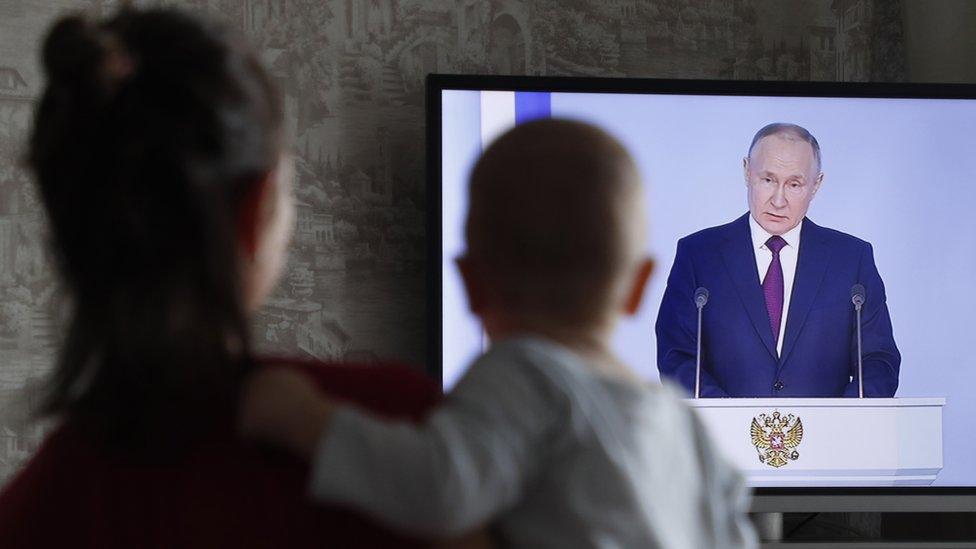Ukraine war: President Putin speech fact-checked
- Published

Vladimir Putin was delivering a state-of-the-nation speech to Russians
President Vladimir Putin addressed the Russian public in a national address which lasted for almost two hours.
In the speech, he made a series of claims about the war in Ukraine and was highly critical of Western countries.
We've looked into some of his statements.
'The neo-Nazi regime that set up in Ukraine after 2014'
Mr Putin has repeatedly made baseless claims about a "neo-Nazi regime" in Ukraine as a justification for Russia's invasion of the country.
In Ukraine's last parliamentary election in 2019, support for far-right candidates was 2%, far lower than in many other European countries.
It should also be noted that President Volodymyr Zelensky is Jewish and members of his family died in the Holocaust.
But there have been far-right groups in Ukraine - the most high-profile is the Azov regiment - elements of which have expressed support for Nazi ideology.
From 2022: Ros Atkins on... Putin’s false Nazi claims about Ukraine
It was formed to resist Russian-backed separatists, who seized areas of eastern Ukraine in 2014, and was subsequently absorbed as a unit within the Ukrainian military.
'One of the brigades of the Ukrainian armed forces... was awarded the name Edelweiss, like the Hitler division'
Here, Mr Putin drew a comparison between a Ukrainian army unit and the Nazis' 1st Mountain Division - which had the Edelweiss flower on its insignia and committed war crimes in the Second World War.
On 14 February, President Zelensky gave, external the 10th Separate Mountain Assault Brigade, external the honorary title: Edelweiss.
The next day, the Russian Ministry of Foreign Affairs highlighted this as "evidence" of Nazis in Ukraine in a tweet.
But the Edelweiss flower - which grows in Alpine regions - has been used as a symbol by other European mountain military divisions, including the Croatian Mountain Rescue Service, external, Swiss Army generals and the 21st Rifles Brigade of Poland.
Even Russia had a special unit called Edelweiss. The 17th special purpose detachment of Rosgvardia was given this title in 2011. The name was changed to Avanguard, external in 2016.
'We also remember the attempts of the Kyiv regime to acquire nuclear weapons, because they talked about it publicly'
There is no evidence that Ukraine has attempted to acquire nuclear weapons, and Mr Putin - who has made this claim before - did not provide any.
When it was part of the former Soviet Union, nuclear weapons were based in Ukraine, but in 1994 Ukraine signed up to the Nuclear Non-Proliferation Treaty and gave them up, in return for security guarantees.
In 2021, the Ukrainian ambassador to Germany, Andriy Melnyk, suggested that if Ukraine couldn't join Nato, it might have to reconsider its nuclear-free status.
In 2022, President Zelensky said, external that although Ukraine had "abandoned" its nuclear capabilities, it had "no security".
But the Ukrainian government has not expressed an intention to acquire nuclear weapons and a military strategy document published in 2021 did not refer to them.
The UN's nuclear watchdog, the International Atomic Energy Agency (IAEA), says it has seen no signs in Ukraine "of the diversion of nuclear material, intended for peaceful activities, for other purposes."
'GDP in 2022 has decreased by only 2.1% and I'll remind you that in February or March they predicted a collapse of the Russian economy'
Mr Putin is right that the Russian economy has shrunk by less than expected.
Russia's statistics agency says the economy measured by GDP contracted by 2.1%, which is close to the 2.2% estimate in the latest report from the International Monetary Fund (IMF), external.
That contraction still makes it the worst-performing country on the IMF's list, but the organisation confirms that it has contracted by less than expected.
The IMF said that Russian trade was being redirected to countries not applying sanctions against it.
India and China have become the largest buyers of Russian oil, for example, as Western nations restrict purchases and impose sanctions.
In July 2022, the IMF was predicting a 6% contraction, external in Russian GDP for the year.

